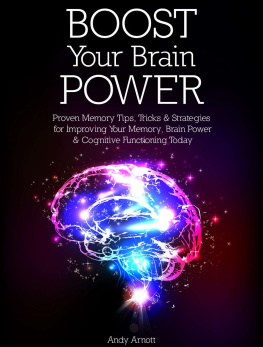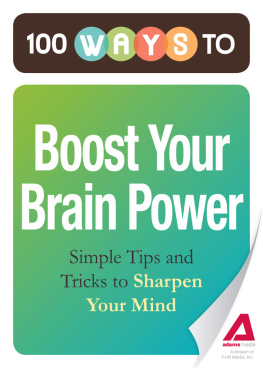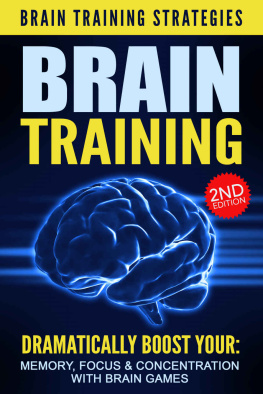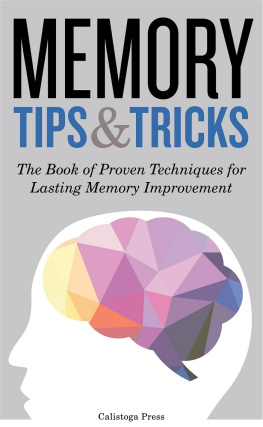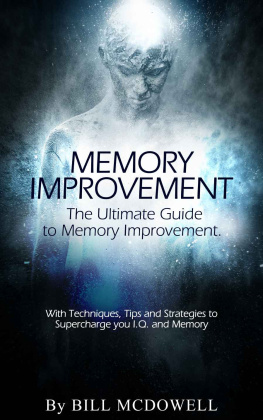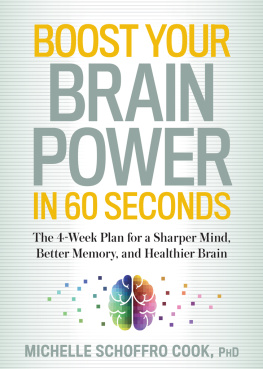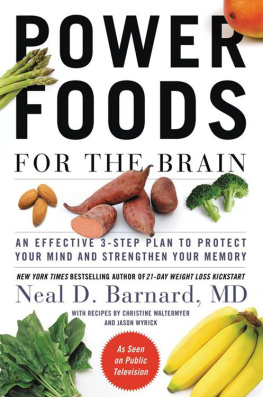Arnott - Boost Your Brain Power: Proven Memory Tips, Tricks and Strategies for Improving Your Memory, Brain Power and Cognitive Functioning Today
Here you can read online Arnott - Boost Your Brain Power: Proven Memory Tips, Tricks and Strategies for Improving Your Memory, Brain Power and Cognitive Functioning Today full text of the book (entire story) in english for free. Download pdf and epub, get meaning, cover and reviews about this ebook. year: 2014, publisher: Good Living Publishing;Arnott, Andy., Createspace Independent Pub, genre: Romance novel. Description of the work, (preface) as well as reviews are available. Best literature library LitArk.com created for fans of good reading and offers a wide selection of genres:
Romance novel
Science fiction
Adventure
Detective
Science
History
Home and family
Prose
Art
Politics
Computer
Non-fiction
Religion
Business
Children
Humor
Choose a favorite category and find really read worthwhile books. Enjoy immersion in the world of imagination, feel the emotions of the characters or learn something new for yourself, make an fascinating discovery.
- Book:Boost Your Brain Power: Proven Memory Tips, Tricks and Strategies for Improving Your Memory, Brain Power and Cognitive Functioning Today
- Author:
- Publisher:Good Living Publishing;Arnott, Andy., Createspace Independent Pub
- Genre:
- Year:2014
- Rating:4 / 5
- Favourites:Add to favourites
- Your mark:
- 80
- 1
- 2
- 3
- 4
- 5
Boost Your Brain Power: Proven Memory Tips, Tricks and Strategies for Improving Your Memory, Brain Power and Cognitive Functioning Today: summary, description and annotation
We offer to read an annotation, description, summary or preface (depends on what the author of the book "Boost Your Brain Power: Proven Memory Tips, Tricks and Strategies for Improving Your Memory, Brain Power and Cognitive Functioning Today" wrote himself). If you haven't found the necessary information about the book — write in the comments, we will try to find it.
Arnott: author's other books
Who wrote Boost Your Brain Power: Proven Memory Tips, Tricks and Strategies for Improving Your Memory, Brain Power and Cognitive Functioning Today? Find out the surname, the name of the author of the book and a list of all author's works by series.
Boost Your Brain Power: Proven Memory Tips, Tricks and Strategies for Improving Your Memory, Brain Power and Cognitive Functioning Today — read online for free the complete book (whole text) full work
Below is the text of the book, divided by pages. System saving the place of the last page read, allows you to conveniently read the book "Boost Your Brain Power: Proven Memory Tips, Tricks and Strategies for Improving Your Memory, Brain Power and Cognitive Functioning Today" online for free, without having to search again every time where you left off. Put a bookmark, and you can go to the page where you finished reading at any time.
Font size:
Interval:
Bookmark:
Your Free Gifts
As my way of saying thank for buying I puttogether two amazing free gifts for you.
These gifts are the ultimate bonus upgradeto this book
TheBrain Boosting Recipe Guide
&
TheSleep Hackers Quick Guide
Click Here to Download Now!
Thanks,
Andy Arnott
Contents
Interest in brainfunction and memory continues to grow on a daily basis, be it because of anaging population or increased demands at work or simply to enjoy a betterquality of life. It was once believed that memory, as well as IQ, were fixedattributes. You either had a good memory or a bad one.
However, we nowknow that is not the case.
We now know that youcan improve your memory in a variety of ways. They do not require trips to thedoctor or a learning lab. In fact many of the ways you can improve your memorydo not relate directly to using or training your brain.
To improve yourmemory and cognitive functioning, you must first have a basic understanding orhow the brain and memory work. You do not have to be a neuroscientist. You justneed to understand some basic principles.
Once you have thegeneral idea of how the brain works, it is critical to learn about whatnegatively impacts the brain and memory. This is what the first sections ofthis book are about and it is all about laying a foundation for your memoryenhancement. Once an understanding is achieved, you will learn what improvesyour brain from a lifestyle perspective. While you may not be able to makedramatic changes to every area of your lifestyle to improve your memory andbrain functioning (like quit a high stress job), you will learn ways to helpmitigate the elements of your lifestyle that negatively impact the performanceof your bodys supercomputer.
After lifestyleconsiderations are addressed, the secondary sections of this book provide avariety of tips, tricks, and daily practices to improve your memory andfunctioning. Again, the focus of these tools is to be enjoyable, easy toimplement, and effective. You do not have to implement all of the suggestionsin this book to see improvements to your brain, IQ and memory.
Even one or twotricks can provide a noticeable improvement. The goal is to try the tricks andsee what works best for you based on your personal preferences and the reasonsfor upgrading your brain.
You will see an improvementin your functioning by using the tools and techniques in this book in a matterof hours, not days. In fact, many of the tricks and tips covered can be learnedand implemented in minutes.
Much of this bookis particularly geared towards improving and upgrading your memory, there is avery specific reason for this. By choosing to focus upon improving your memoryfirst and foremost you will see a huge layover into the level of your cognitivefunctioning and IQ. The brain is all interconnected and improving one area willflow into improvements in other areas, the most powerful way to do this is toplace a large focus on memory improvement.
You might bewondering can improving your brain power enhance your relationships, your workperformance, your earning potential, your ability to learn easily, your overallquality of life and even how you feel about yourself? Yes, it can!
Are you ready to quicklyand easily improve your brain, memory and IQ?
Well, theres nobetter time than right now to learn how your brain and memory work so you canstart to change your entire life.
Until recently,memory was viewed two ways.
One, it wasbelieved that memory was a fixed commodity. You either had a good memory, a badmemory, or a memory that fell somewhere in between.
It was believed tobe similar to other personal traits like hair or eye color. What you had atbirth is what you had to work with, period. People understood a good memory maybecome a bad memory for a variety of reasons, but it was not a common beliefthat a bad memory could become a better one.
Two, memory wasbelieved to be located in a distinct area of the brain. A popular notion wasthat memory was like a file cabinet, when recalling something the brain wouldopen up the drawer labelled memory and look for the file title with thememory (say wedding proposal) and read the file. If a person had a badmemory, the thought was that the filing system was in disarray or the file cabinetwas damaged causing memories to be lost in the system of the brain.
That was twentiethcentury thinking.
In thetwenty-first century, our knowledge about how the brain works has created a newmodel for how memory works. We will call this new memory model Memory 2.0.
Now, doctors andscientist understand that the brain is not simply a mass in the cranium. It isa muscle. Like other muscles in the body, the brain and its memory function canbe developed and improved with exercise. In fact, without regular exercise orstimulation the brain atrophies just like other muscles in the body that becomeweak and shrink without use.
As far as theconcept of the memory working like a fixed object, memory 2.0 does not worklike a file cabinet. In fact, memory is not a discrete part of the brain atall. While tasks like speech can be traced back to specific areas of the brain,memory is a brain-wide function. A stroke can cause a person to lose all orpart of the ability to speak or function in particular ways, but a stroke doesnot necessarily cause a persons memory to suffer. How is that possible? Well,memory is tied to connections made throughout the brain. The more connectionsassociated with a memory and made within the brain, the better the memoryperforms, even in situations where specific parts of the brain are damaged.This is one reason that a person who has Alzheimers disease can havedifficulty with some memory processes while maintaining a sharp recollection ofdistant memories or to those items that have a strong emotional tie. The factis, to improve your memory you need to simply improve the number and quality ofthe associations and connections you make with what you aim to remember.
Memory, as aprocess, is divided into two components: short term memory and long termmemory. Even as a memory is being created it is being processed, and meaning isbeing given.
This is part ofsurvival. Think about what would happen if a caveman had to stop, experience athreat, and then wait to process what it all meant before being able to defendhimself. Yes, if we had to stop and think about thinking, the human race wouldnever have survived. This almost instantaneous processing is indeed part of thememory process and it is called sensory memory.
The associationsmade while in the middle of an experience are connected to previous events andprior knowledge. The transition from sensory memory and perception toprocessing is part of your short term memory process. Short term memory is likea filter, deciding what is important and what is not, that holds informationfor a matter of seconds. If you have ever been in a situation when your mindhas wandered in class or in a business meeting only to be called on torecollect something the speaker just said, you have used your short term memorystorage of stimuli to reply (hopefully, correctly) with what was just covered.
While sensorymemory and short term memory quickly decay, a healthy brain has the ability tostore unlimited amounts of information indefinitely. This ability is calledlong term memory, which is what most people generally refer to as memory.Long term memory uses past experience to inform the current situation andprovides a pathway for the brain to remember the event as an associationbetween past and present for future reference and meaning.
Forgetting things,for a healthy person, is the result of one or more problems related to thethree Rs: registration, retention, or retrieval. Forgetting due to a problem inregistration is because of an issue with how you encoded the information in thefirst place. When you forget where you put your car keys, you have not reallyforgotten. Instead, you may have been distracted when you put them down, soyour brain did not encode the placement as being important. Similarly, if youalways put your keys in the same place, you may not be able to recall themoment you put them down in their proper place because the habitual nature ofthe act will cause your brain to register the act as not important enough tocreate a detailed or lasting memory.
Font size:
Interval:
Bookmark:
Similar books «Boost Your Brain Power: Proven Memory Tips, Tricks and Strategies for Improving Your Memory, Brain Power and Cognitive Functioning Today»
Look at similar books to Boost Your Brain Power: Proven Memory Tips, Tricks and Strategies for Improving Your Memory, Brain Power and Cognitive Functioning Today. We have selected literature similar in name and meaning in the hope of providing readers with more options to find new, interesting, not yet read works.
Discussion, reviews of the book Boost Your Brain Power: Proven Memory Tips, Tricks and Strategies for Improving Your Memory, Brain Power and Cognitive Functioning Today and just readers' own opinions. Leave your comments, write what you think about the work, its meaning or the main characters. Specify what exactly you liked and what you didn't like, and why you think so.

